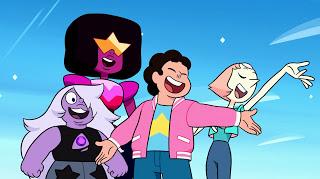 The 2010s have been a renaissance for Western Animation, with an extraordinary boom of cartoons geared towards both kids (Adventure Time, Gravity Falls, Over the Garden Wall) and adults (Archer, Bob's Burgers, BoJack Horseman). Rebecca Sugar's Steven Universe, airing on Cartoon Network since 2013, is one of the era's crown jewels. Nominally a children's series, its imaginative animation, emotional songs, richly-drawn characters and themes of empathy and acceptance earned it a passionate fandom within and outside its target audience. I've written elsewhere about the show's exemplary handling of trauma and mental health; many LGBT viewers love its treatment of same-sex relationships, still a rarity in children's entertainment.
The 2010s have been a renaissance for Western Animation, with an extraordinary boom of cartoons geared towards both kids (Adventure Time, Gravity Falls, Over the Garden Wall) and adults (Archer, Bob's Burgers, BoJack Horseman). Rebecca Sugar's Steven Universe, airing on Cartoon Network since 2013, is one of the era's crown jewels. Nominally a children's series, its imaginative animation, emotional songs, richly-drawn characters and themes of empathy and acceptance earned it a passionate fandom within and outside its target audience. I've written elsewhere about the show's exemplary handling of trauma and mental health; many LGBT viewers love its treatment of same-sex relationships, still a rarity in children's entertainment.Last month, Cartoon Network released a feature-length Steven Universe movie. For a show so heavy in lore and mythology, it's probably the best fans could have hoped for: a standalone work which restates the series' main themes in a powerful way, with musical numbers that allow its gifted voice cast to shine. (Spoilers for the series: if you plan to go through the show before checking out the movie, read carefully.)
Steven Universe (Zach Callison) is the teenage son of musician Greg (Tom Scharpling) and alien rebel Rose Quartz. Rose, actually the warlord Pink Diamond, led a rebellion against the Gem Homeworld to prevent the colonization of Earth; her allies, the Crystal Gems, serve as Steven's guardians: uptight Pearl (Deedee Magno Hall), laid back Amethyst (Michaela Dietz), stoic Garnet (Estelle). Two years after the series, Steven and the Gems live in peace at Beach City, their feud with Homeworld forgotten...until a mysterious gem named Spinel (Sarah Stiles) arrives with a grudge against Rose and a doomsday weapon capable of wiping out life on Earth.
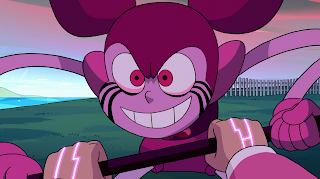 Like most feature adaptations, Steven Universe: The Movie faces the challenge of making the backstory accessible to casual viewers. Sugar achieves this by envisioning a standalone plot and recapitulating the characters' backstories through song. In the opening number ("Happily Ever After") alone we learn about Steven grappling with his mom's actions; Pearl, a servant-turned-warrior, struggling with her unresolved feelings towards Rose; Amethyst, an Earth-born Gem struggling to fit in; Garnet, a fusion between two different Gems, verboten on Homeworld. It helps that much of the story involves Spinel resetting the Gems to their default forms, so that Pearl can helpfully explain each Gem type's assigned role.
Like most feature adaptations, Steven Universe: The Movie faces the challenge of making the backstory accessible to casual viewers. Sugar achieves this by envisioning a standalone plot and recapitulating the characters' backstories through song. In the opening number ("Happily Ever After") alone we learn about Steven grappling with his mom's actions; Pearl, a servant-turned-warrior, struggling with her unresolved feelings towards Rose; Amethyst, an Earth-born Gem struggling to fit in; Garnet, a fusion between two different Gems, verboten on Homeworld. It helps that much of the story involves Spinel resetting the Gems to their default forms, so that Pearl can helpfully explain each Gem type's assigned role.Steven Universe: The Movie resembles the Disney spectaculars of yore more than the "magical princess" anime channeled by the series. Where the show leans towards short but effective character songs, the movie goes for elaborate Broadway-style numbers, using its cast to great effect. Deedee Magno Hall, a one-time Miss Saigon, knocks Pearl's numbers out of the park; as Garnet, R&B singer Estelle gets a Beatles-style retro-pop number ("Isn't This Love") and a catchy lo-fi jam ("True Kinda Love"). Uzo Aduba (Orange is the New Black) plays Steven's jovial ally Bismuth. Broadway legends Christine Ebersole and Patti LuPone are the no-longer villainous Diamonds, alongside Irish singer Lisa Hannigan. Indy rockers Aimee Mann and Ted Leo appear as two fusion characters (Leo as "Steg," an ultra-ripped fusion of Steven and his dad) for a show-stopping duet ("Independent Together").
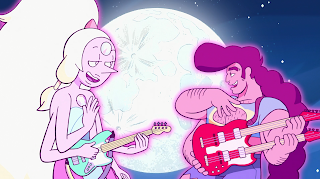 Resetting the characters feels almost like a cheat, leaving the ticking time bomb of Spinel's weapon in the background. Yet it allows for wonderful affirmations of their development. Pearl's arc (her obsessive attachment to Rose/Pink, even after death) has always been the show's most tragic storyline; she's granted a triumphant moment where she realizes that "I'm the master of me" and finally seizes her individuality. Steven, who's been wrestling with his mother's legacy throughout the show, finally realizes that his superpower isn't his Gem-inherited abilities but his ability to change and grow with experience. Kudos here to Zach Callison, who after years voicing a precocious fourteen year old finally scales up to a more mature, self-aware version of Steven.
Resetting the characters feels almost like a cheat, leaving the ticking time bomb of Spinel's weapon in the background. Yet it allows for wonderful affirmations of their development. Pearl's arc (her obsessive attachment to Rose/Pink, even after death) has always been the show's most tragic storyline; she's granted a triumphant moment where she realizes that "I'm the master of me" and finally seizes her individuality. Steven, who's been wrestling with his mother's legacy throughout the show, finally realizes that his superpower isn't his Gem-inherited abilities but his ability to change and grow with experience. Kudos here to Zach Callison, who after years voicing a precocious fourteen year old finally scales up to a more mature, self-aware version of Steven.The key character is Spinel, a newcomer to the show. Brilliantly voiced by Sarah Stiles (another Broadway talent, currently starring in Tootsie and on TV's Get Shorty), she's initially Harley Quinn imagined by Max Fleischer, an evil jester with rubber hose arms and a broad Brooklyn accent. During her intro, she belts out a manic electro-swing number ("Other Friends") while cutting down the Gems with a scythe. (One wonders how much of the animation budget went into this character.) Later she's reset into a clingy, cutey-pie clown who resembles a feminine Mickey Mouse. What turned such a sweet, harmless Gem into a monster?
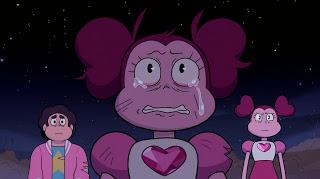 Steven Universe excels in granting even its villains humanity. And Spinel's backstory is a doozy. A friend of Rose/Pink Diamond before the rebellion, she was stranded on a planet for literally thousands of years, waiting for her to return. Sugar, and Stiles, sell this with a heartbreaking ballad ("Drift Away") where Spinel bemoans "turning pages for people who don't care about you." Deeply traumatized, she wants to take out her rage on those who usurped her friendship. Even after a momentary change of heart, she turns on Steven when he unwittingly triggers her fear of abandonment. Her trauma has made her destructive, self-loathing and reluctant to truly change.
Steven Universe excels in granting even its villains humanity. And Spinel's backstory is a doozy. A friend of Rose/Pink Diamond before the rebellion, she was stranded on a planet for literally thousands of years, waiting for her to return. Sugar, and Stiles, sell this with a heartbreaking ballad ("Drift Away") where Spinel bemoans "turning pages for people who don't care about you." Deeply traumatized, she wants to take out her rage on those who usurped her friendship. Even after a momentary change of heart, she turns on Steven when he unwittingly triggers her fear of abandonment. Her trauma has made her destructive, self-loathing and reluctant to truly change.Steven, naturally, extends her compassion; his defining character trait has always been empathy for others, usually to great effect. Yet this time, Spinel's road to redemption isn't his to shape. She must make the choice to change; all the understanding in the world can't make her a better person. The movie offers a convenient but endearing climax where the Diamonds, the rulers of Homeworld, offer Spinel a home and a chance to start fresh. For fans who've criticized Steven Universe for leaning too heavily on forgiveness, it adds welcome complexity to its usual message.
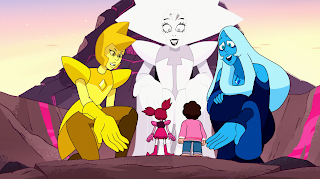 Whether Steven Universe: The Movie wins the show new converts is debatable. Admittedly, the plot is thin and the show's deep supporting cast - Shelby Rabara's hyperactive nerd Peridot, Jennifer Paz's moody Lapis Lazuli, Grace Rolek as Steven's human friend Connie - receives short shrift. For all its virtues it's still primarily a kid's show; cynics might find the messages treacly rather than touching. But it captures all of Steven Universe's strengths, namely a warm, touching humanism that recognizes the worth and potential in all people. In 2019, it's a message we could all take to heart.
Whether Steven Universe: The Movie wins the show new converts is debatable. Admittedly, the plot is thin and the show's deep supporting cast - Shelby Rabara's hyperactive nerd Peridot, Jennifer Paz's moody Lapis Lazuli, Grace Rolek as Steven's human friend Connie - receives short shrift. For all its virtues it's still primarily a kid's show; cynics might find the messages treacly rather than touching. But it captures all of Steven Universe's strengths, namely a warm, touching humanism that recognizes the worth and potential in all people. In 2019, it's a message we could all take to heart.

